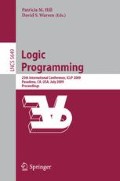Abstract
The aim of this research is to generate random logic programs and study their properties such as the occurrence of an easy-hard-easy pattern and the probability of existence of stable models for these programs. The primary focus is on generating random logic programs that can be classified to be hard for ASP solvers based on the time taken and the number of choice points generated by them in finding a stable model. Our study and generation of random logic programs have been motivated by two key reasons: hard random logic programs can be used as benchmarks for evaluating the algorithms used in existing ASP solvers, and experimental analysis as well as theoretical studies of the properties of these random logic programs can provide us with insights for improving the design of the heuristics/algorithms in these solvers.
Access this chapter
Tax calculation will be finalised at checkout
Purchases are for personal use only
References
Schilpf, J., Truszczyński, M., Wong, D.: On the distribution of programs with stable models, 05171 Abstracts Collection – Nonmonotonic Reasoning. Answer Set Programming and Constraints (2005)
Zhao, Y.: Random generated logic programs, 05171 Abstracts Collection – Nonmonotonic Reasoning, Answer Set Programming and Constraints (2005)
Zhao, Y., Lin, F.: Answer set programming phase transition: A study on randomly generated programs. In: Palamidessi, C. (ed.) ICLP 2003. LNCS, vol. 2916, pp. 239–253. Springer, Heidelberg (2003)
Author information
Authors and Affiliations
Editor information
Editors and Affiliations
Rights and permissions
Copyright information
© 2009 Springer-Verlag Berlin Heidelberg
About this paper
Cite this paper
Namasivayam, G. (2009). Study of Random Logic Programs. In: Hill, P.M., Warren, D.S. (eds) Logic Programming. ICLP 2009. Lecture Notes in Computer Science, vol 5649. Springer, Berlin, Heidelberg. https://doi.org/10.1007/978-3-642-02846-5_61
Download citation
DOI: https://doi.org/10.1007/978-3-642-02846-5_61
Publisher Name: Springer, Berlin, Heidelberg
Print ISBN: 978-3-642-02845-8
Online ISBN: 978-3-642-02846-5
eBook Packages: Computer ScienceComputer Science (R0)

